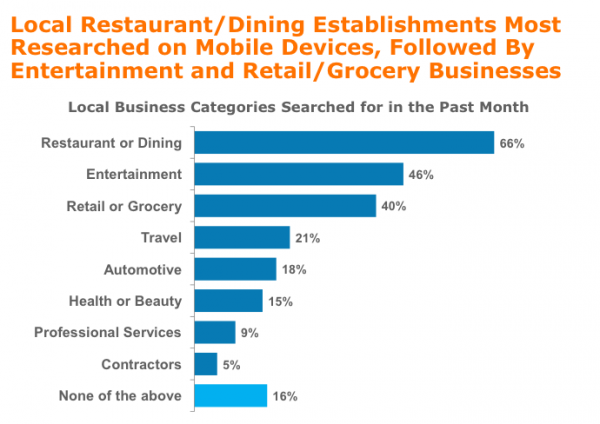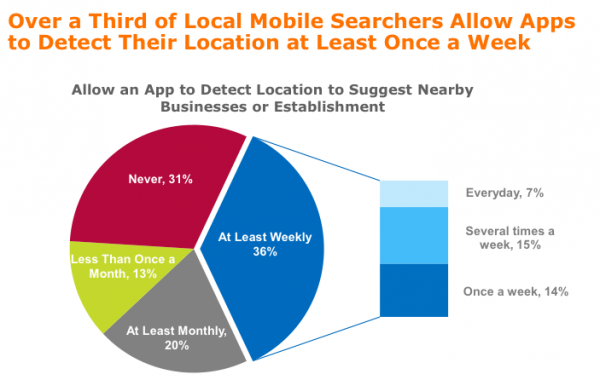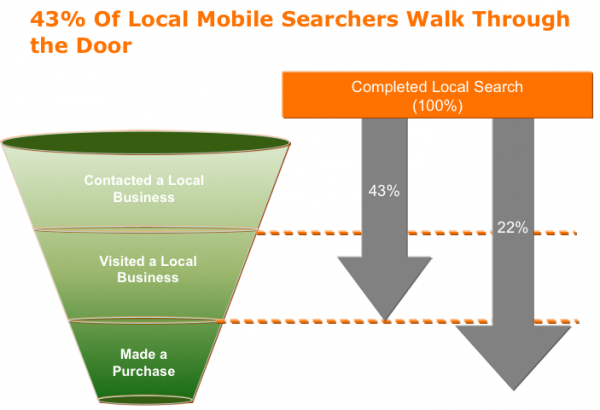AT&T: 43 Percent Of Local-Mobile Searchers “Walk Through The Door”
There are a number of studies (e.g., Pew, Forrester) in the market that question how interested or engaged users are with “location based services.” Those studies tend to narrowly focus on Foursquare, Gowalla and mobile check-ins. They tend to miss the larger point about the importance of location on mobile devices. A new study from […]
There are a number of studies (e.g., Pew, Forrester) in the market that question how interested or engaged users are with “location based services.” Those studies tend to narrowly focus on Foursquare, Gowalla and mobile check-ins. They tend to miss the larger point about the importance of location on mobile devices.
A new study from AT&T Interactive and Nielsen, conducted this March, validates that location is a key part of the mobile-user experience. The study also reflects the often-superior performance of local-mobile ads.
Restaurants the Top Local-Mobile Category
AT&T VP Steven Wise presented findings from that study, which involved 1,500 US consumers who owned feature phones, smartphone and tablets, today at the Where 2.0 conference in San Jose California. Consistent with other studies in the market the AT&T-Nielsen survey found that restaurants was the top local search category in mobile.
Beyond that the chart above reflects the hierarchy of local business categories that were “most researched” on mobile devices. Even though “professional services” and “contractors” showed relatively lower volume those users turned out to be the most likely to click on mobile ads, according to AT&T.
Younger Users More Inclined to Share Location
There’s evidence from various sources of consumer concern over privacy, especially among older mobile users. The AT&T-Nielsen study is consistent and shows that men under 45 are more inclined to share their location with mobile apps.
One of the reasons for allowing location detection is to enable exposure of “nearby” businesses or get local recommendations. More than a third of respondents said they allowed apps to get a fix on their location at least weekly (putting aside surreptitious iPhone tracking). More than 20 percent did this several times a week or more.
Local Ads Perform Better
I’ve written numerous times about the greater relevance of location-based ads in mobile and the improved consumer response accordingly. Microsoft has said that 53 percent of mobile search has local intent and Google has said the number is 33 percent. In addition, mobile users are generally more inclined to take immediate action than PC searchers, according to both Google and Microsoft.
Surojit Chatterjee, Product Lead Local and Mobile Ads, has said, “Mobile users are more prone to take immediate action. People searching on mobile have a higher intent. The time between intent and action has been narrowed.”
The combination of higher intent and greater interest in locally relevant information makes for a potent combination for mobile marketers. The AT&T study found that about two-thirds of local-mobile search users see ads weekly; and roughly 25 percent of users click on mobile ads at least weekly.
The graph below indicates users’ motivations for clicking on mobile ads.
Local-Mobile Searchers Go to the Store — and Buy
Given all of the above perhaps it comes as no surprise that the study found 43 percent of local searchers on mobile devices physically showed up at the business location. Perhaps even more impressively 22 percent of those users actually made a purchase.
While the future of the check-in as a mainstream phenomenon in mobile can be debated at length there should be no doubt about the importance or value of local content and locally relevant ads to mobile users.
Contributing authors are invited to create content for Search Engine Land and are chosen for their expertise and contribution to the search community. Our contributors work under the oversight of the editorial staff and contributions are checked for quality and relevance to our readers. The opinions they express are their own.
Related stories
New on Search Engine Land



